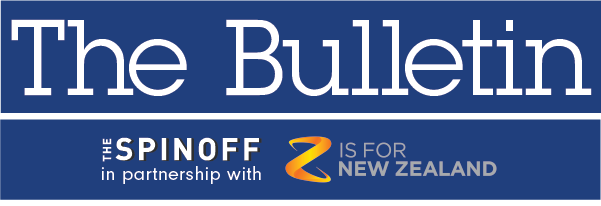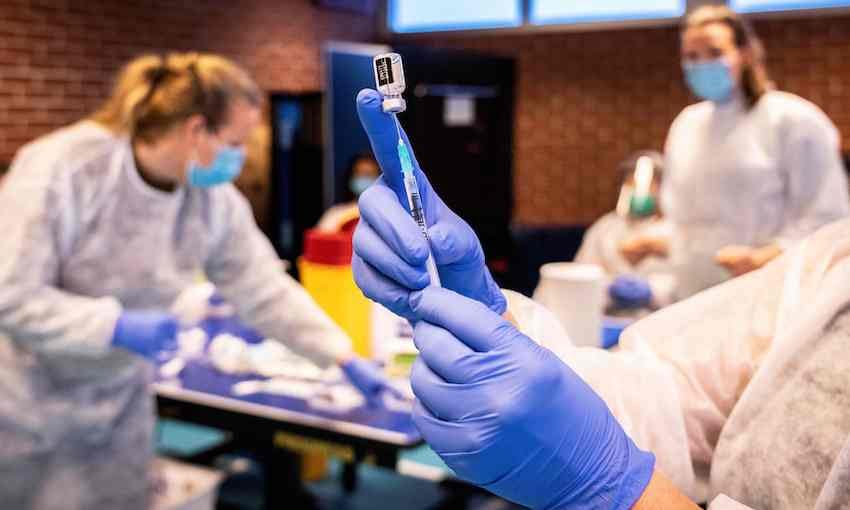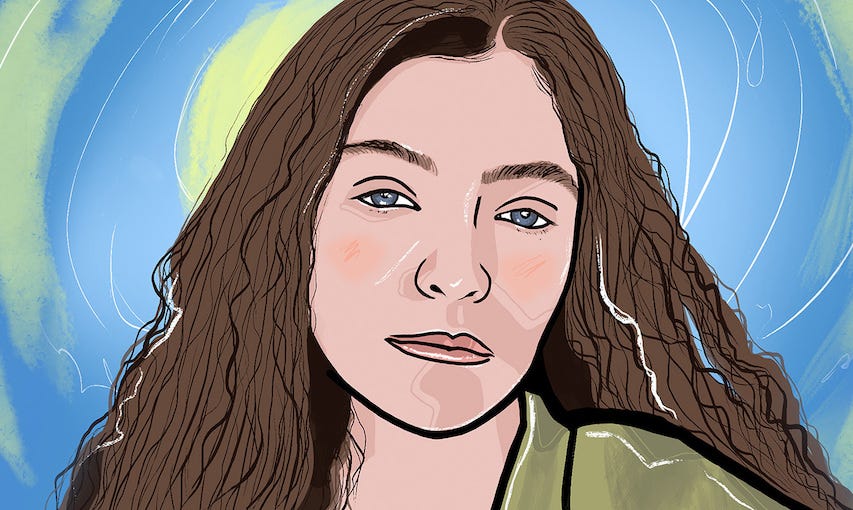Extra doses arrive as vaccine programme breaks records
After a slow start, NZ is now rolling out doses at record speed and more than half the population has had a jab, the programme could soon surpass the US effort
Good morning and welcome to The Bulletin for Friday, September 10, by Justin Giovannetti. Presented in partnership with Z Energy.
In today’s edition: Another Covid-19 case in Middlemore hospital, a record surge in coal use, and good news about New Zealand’s vaccine programme.
A nurse prepares a syringe with vaccine against Covid-19. (Ole Berg-Rusten / Getty Images)
By the time you read this a shipment of 250,000 extra vaccine doses should have arrived in New Zealand from Spain. As RNZ reports, the top-up means the country’s vaccination programme won’t need to be slowed down this month. There’s been an unprecedented surge in recent weeks as demand for jabs soared, with nearly a million doses administered over the past fortnight. The prime minister, who counts Spanish president Pedro Sánchez as one of her close friends on the world stage, said another delivery from a second country was still in negotiations, but details are expected next week. The Spanish deal wasn’t a swap, it was a simple purchase. No price was disclosed, but Ardern said the deal was in “good faith”. She then clarified to people who hadn’t caught her verbal wink that she was trying to imply it was a good deal.
Gracias España.
After a very slow start, New Zealand now has a record-setting immunisation programme. New Zealand’s Covid-19 vaccine programme was slow out the gate, months behind countries in Europe and North America. As recently as last month, Aotearoa was still the least vaccinated place among rich countries. That’s changed rapidly. Stuff’s Henry Cooke has found that New Zealand is now vaccinating about 1.5% of its population daily, faster than any of the countries we compare ourselves to, and is powering up the list of vaccinated countries.
More than half the population has had one dose, surpassing Australia. With all 10 million doses on order expected to be delivered by Pfizer next month, New Zealand could soon overtake the United States for percentage of the population jabbed. However it’s unclear when, as director-general of health Ashley Bloomfield warned earlier this week that the overall rate of vaccination is now slowing as some parts of the country are running out of people to immunise.
Press play and watch the vaccination race on Our World in Data. Don’t stop before you reach the end.
There remains uneven vaccination rates across New Zealand. Māori leaders told RNZ that a different approach to the vaccine drive is urgently needed to reach young Māori as a gap in immunisation levels has proven stubborn. Expanding the programme to everyone over the age of 12, allowing entire families to go at once, hasn’t led to a boost in levels. Māori between 20 and 34 years old have been vaccinated in far fewer numbers than other ethnicities in the country. Despite nearly a year of warnings that this might happen, it’s unclear how to change things. Two Labour ministers, Peeni Henare and Willie Jackson, have said they are disappointed with low uptake but think it could change in the coming weeks.
A cautionary tale has emerged in Singapore. Vaccines are an incredibly powerful tool in the fight against Covid-19, but delta has demonstrated that even small pockets of the unvaccinated can allow the virus to thrive. In recent weeks Singapore undertook its pivot to living with the virus, by relaxing restrictions and reopening to the world. Despite nearly 80% of the population vaccinated, over 1300 cases were reported last week and the reopening plan has been stopped, reports news.com.au. Authorities are now trying to contain the virus with contact tracing, but have warned that they might need to reimpose restrictions.
The Spinoff is doing our utmost to keep you updated on Covid-19 related news through this outbreak. Every dollar our members contribute directly funds our editorial team and is devoted to ensuring we do more. Click here to learn how you can support the team today.
A new case at Auckland’s Middlemore hospital. The ministry of health reported late last night that a patient in the emergency department came in with a non-Covid issue and then self-discharged. However, they took a Covid-19 test at the hospital and it later came back positive. As reported in The Spinoff, the patient said they had no contact with anyone exposed to Covid-19 and hadn't been to a location of interest. While the risk at the hospital is low, the local public health unit will be trying to figure out where the mystery case originated today to see if any undetected spread is happening in Auckland.
The Covid numbers: 13 new community cases were reported yesterday and 40% of the previous day’s cases were active in the community while infectious. All the cases were in Auckland. 868 cases have now been detected in the delta outbreak. 265 people have now recovered. 66,935 people were vaccinated yesterday.
New Zealand coal use surges ahead of government climate change announcement. RNZ reports that coal imports hit a record high earlier this year, with 632,000 tonnes entering the country from April to June. It's a reflection of the country's low lake levels behind hydro dams and ongoing gas shortages, but sends the wrong message in 2021. After a blackout in early August, it raise more questions about whether the country's electrical system is fit for purpose.
Decarbonising the country’s electrical system is sure to appear in the government’s climate change plan, which is due before the end of the year. According to the NZ Herald, climate change minister James Shaw will fly to Glasgow in November to attend climate talks. Record imports of coal won't help burnish the country's image.
A paid message from our partner Te Taura Whiri, the Māori Language Commission: Join us in celebrating te reo Māori at 12pm on Tuesday, September 14. Sign yourself and your workplace, whānau and flatmates up to our Māori Language Moment. Kia kaha te reo Māori, kia kaha Aotearoa!
Auckland council wants to add 22,000 houses in Drury but doesn't want current ratepayers to foot the bill. Developers have been told fees on newly built homes could increase up to 660% to fund the building of new infrastructure in the area, the NZ Herald reports (paywalled). That's from $11,000 for a new home now up to $84,500. Financing the construction of new areas is a balance, between spreading the costs across all ratepayers or piling them on newcomers. In the latter case, it’s likely to increase the price paid by home buyers. Council has said they'll push through similar increases in other new areas.
A quick event notice for those in lockdown with children, or those who never lost their love for drawing. Join our celebrated colleague at Sketchin’ In with Toby Morris at 10:30am on Saturday, The Spinoff’s Instagram page will be streaming live from Toby’s living room as he leads a drawing class for all ages and skill levels. Reveal the artist within, or at the very least kill an hour doing something fun. All that’s required is a few bits of paper, a pencil, a pen, and an eraser (or not, if you’re feeling brave). See you there.
After a decade of legal action and appeals, Colin Craig hits the end of his options at the supreme court. Stuff reports the former party leader was told he can't challenge a high court ruling that he sexually harassed his press secretary in the lead up to the 2014 general election. He was ordered to pay Rachel MacGregor's costs. There have been a number of suits and countersuits in the past years involving Craig. After yesterday's decision, MacGregor said she couldn't quite believe that it was over.
Christchurch's new stadium under new scrutiny as council looks to avoid a cost blowout. The stadium's $523 million budget, already boosted by $50 million, had to be redesigned earlier this year to avoid a soaring price tag. The Press reports that council has now put a new manager in charge of the project and appointed another position to ensure it stays on time and budget. Materials and labour costs are high, so it'll be a challenge to deliver both.
New South Wales recorded another 1405 cases and five deaths yesterday, despite that, it unveiled its plan to open up. In just over a month gyms, hospitality venues and shops will reopen to the fully vaccinated, ABC has reported. Outdoor mask mandates will also be lifted, likely around October 18. The plan, which ends stay-at-home orders, takes effect the Monday after 70% of the state's adults are fully vaccinated. The state premier called it "freedom" but it looks more like New Zealand's delta level two.
The Sydney Morning Herald reports that Australia is also likely to end a federal ban in November on leaving the country.
Got some feedback about The Bulletin, or anything in the news?
Get in touch with me at thebulletin@thespinoff.co.nz
Right now on The Spinoff: Leonie Hayden has an exclusive story about the five songs from Lorde's Solar Power album re-recorded in te reo Māori, speaking with both the artist and the team that made it happen. Catherine Woulfe writes that despite the Pōhutukawa, the flax and ferns, the Tui Street address and the non-Scottish letterboxes and dairies, the Scots still think that Hairy Maclary is Scottish. Phil Pennington reports that first-home buyers should not buy new builds because of the risk of cost overruns. Chris Schulz profiles the rise of Peach's Hot Chicken, a story that is bound to make you hungry. Bernard Hickey asks what the future of capitalism will be after patience is running thin with greedy, hypocritical corporate giants.
For a feature today, why no one is listening to the experts on how to end megafires. ProPublica writes that record fires burning across the west coast of North America shouldn't come as a surprise to anyone, wildland firefighters have been warning for decades where they are coming from and how to stop them. In short: We don't let forests burn anymore. Forest fires are normal, stopping them isn't. To restabilise the state of California alone, a study last year concluded that it should let an area about the size of the north island burn in a single year. Here’s a sample:
So what’s it like? “It’s just … well … it’s horrible. Horrible to see this happening when the science is so clear and has been clear for years. I suffer from Cassandra syndrome,” Ingalsbee said. “Every year I warn people: Disaster’s coming. We got to change. And no one listens. And then it happens.”
The pattern is a form of insanity: We keep doing overzealous fire suppression across California landscapes where the fire poses little risk to people and structures. As a result, wildland fuels keep building up. At the same time, the climate grows hotter and drier. Then, boom: the inevitable.
Auckland’s provincial rugby teams have asked the government for an exemption. The Auckland, North Harbour and Counties Manukau teams want to travel out of level four and train in Taupō, the NZ Herald (paywalled) reports. The teams would leave Auckland when the city moves down to level three, which New Zealand Rugby hopes will be next Wednesday. The three teams would be based out of the Wairakei Resort. With strict limits on crowds, it isn't clear yet whether they'd play in front of an empty stadium or wait for level one.
That's it for The Bulletin. If you want to support the work we do at The Spinoff, please check out our membership programme.







